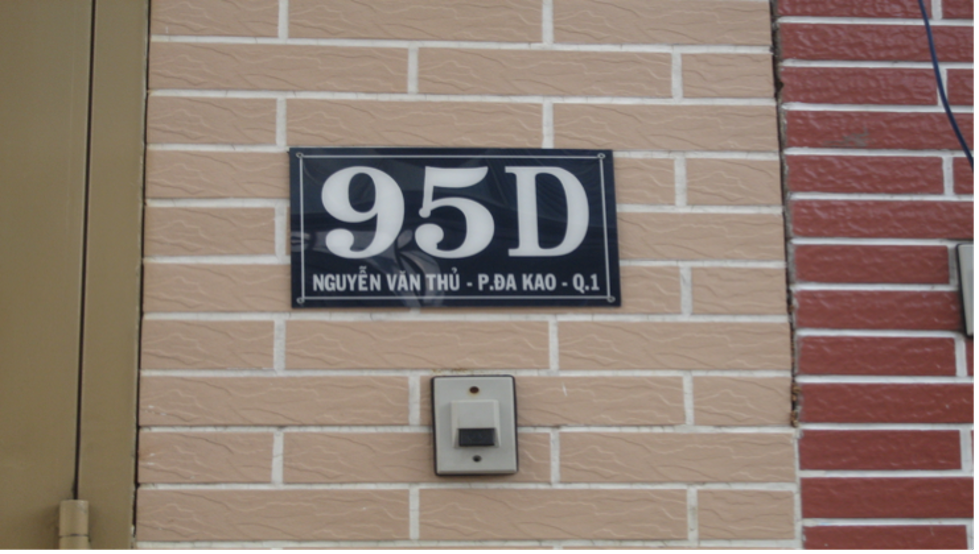
The A/C and ceiling fan at 95D Nguyen Van Thu Street are white noise and always there, but the clock alarm’s frequency is different and pulls me back from a deep slumber. I hit snooze and wrap the sheet tighter, hoping to catch another minute of sleep. The oppressive heat of the Saigon night has diminished. At 5:15 a.m. the street outside is quiet except for an occasional motorbike.
I peel back the covers and sit on the edge of the bed. The walls are sweating and there’s a faint hint of mold. Heavy condensation on the front window makes the streetlight a yellowish blur. I step onto the cool tile floor, turn on the computer and link to the Seattle NPR station. There are tornados in Oklahoma, floods in Texas. In Seattle, it’s the usual November rain.
I turn the A/C down and open our hallway door. A rush of stored heat hits me along with the faint aroma of Indian spices. My wife and I look at each other. Curry and cumin at 5:15 a.m.? Our Indian neighbors are already cooking. I pad barefoot to the kitchen, get yoghurt and two small Asian bananas, and return to the bedroom.
_____
I first came here during the “American War,” an ex-Marine turned commercial pilot, flying troops in and out of the country for R&R. Marilynn and I returned in 2007 for a bicycle tour. Once back in the States, I told a friend how impressed we were with the industry and hospitality of the Vietnamese. He asked me to help his organization raise money for projects in Vietnam and now I’m managing its Saigon office.
_____
At 5:45a.m. we close the door behind us. We’re on our way to the gym. It’s as cool as it will get today. Stepping onto the landing we’re met with a blast of even hotter air, stronger Indian aromas, and rising cigarette smoke. We look at each other, nod toward the stairway and take it instead of the elevator. Two floors below, the apartment door stands open. Suspicions confirmed. The Indian family doesn’t like air-conditioning. They manage the heat by leaving the front door and all the windows open. They’ve spent their entire lives on the sub-continent in temperatures like these. We wonder if strident voices are part of the same heritage? I suspect it’s an arranged marriage, a commercial contract between families. A business deal. They don’t seem to dislike each other but their strident voices make me wonder. Judging other cultures is tricky business, but my guess is they’re in it for the long haul.
Our building is modern but typically Vietnamese – tall and narrow. Six apartments stacked vertically above the lobby entrance. All six are occupied by expats. In addition to the Indians there’s a nondescript Belgian couple, a sexy 50-ish Frenchwoman whose young Vietnamese boyfriends deliver her to the door on the back of their motorbikes, an Australian who gets sideways with the houseman whenever he brings a Vietnamese girl in for a sleepover, and two Australian pilots who use the apartment as a crash pad between flights.
On the ground floor Mr. Vinh, the houseman, in a ribbed undershirt, khaki shorts, and flip-flops puts his cigarette down to summon a taxi for us. He never looks us in the eye or has much to say. He steals small things and uses our washer-dryer when we’re out of town. We step out the gate to avoid the smoke and wait for the cab as the sky begins to lighten.
Mrs. Van, our landlady at 95D Nguyen Van Thu, likes expatriates. She especially likes the monthly wire transfer of US dollars into her bank account. She accepts only dollars or euros – no Vietnam Dong. She is close to our age, overweight for a Vietnamese, and always dressed in black. She lives next door but often sits in our lobby where she can watch her cash flow come and go and gossip with Mr. Vinh.
_____
Despite the North’s victory in 1975, Vietnam is still divided. Dialects and attitudes differ. Northerners claim linguistic and cultural superiority, and there is plenty of North-South animosity remaining. After the “American War” the victors celebrated by renaming Saigon Ho Chi Minh City. Officially, it is HCMC, but expatriates and local Vietnamese refer to the old city as Saigon while acknowledging the greater urban area as HCMC.
Eight million motorbikes, nine million people, 30,000 taxis, rolling food carts, curbside grills, sidewalk tents and open-air cafes. Sidewalks are crowded. Walking in the street is both mandatory and dangerous. In our four years here, my wife still doesn’t cross the street without holding my hand. I always remind her – “Walk at a steady pace, eyes forward, without stopping. They’ll make the adjustments.”
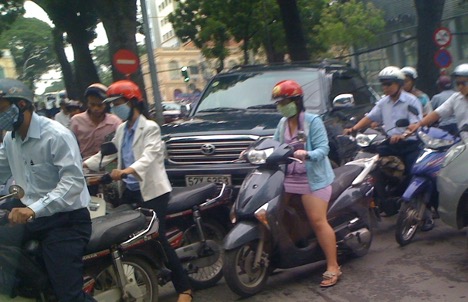
At all hours of the day and night the sidewalks are crowded with men in their undershirts sitting on children’s plastic chairs. In the morning they drink tea or coffee, in the afternoon they switch to beer. In the evening it’s more beer and later it will be karaoke, sometimes a prostitute…and more beer.
_____
This morning it’s relatively quiet. After our workout at the historic Hotel Rex, where General Westmoreland delivered his infamous press briefings, Marilynn and I walk up Dong Khoi Street to our favorite café, Coffee Bean and Tea Leaf. Its terrace, across from Notre-Dame Cathedral, offers the best people-watching in town. Cathedral Square is now the social center of the city. Notre-Dame, and the ornate Saigon Central Post Office just behind it are two great examples of 19th century French-style architecture.
Because of their colonial history, the Vietnamese have no reverence for the French or their architecture. Many of the wonderful old buildings have been torn down and replaced with shopping malls and high-rise apartment houses. The cathedral and post office are exceptions. Built during the late 19th century French Indochina period, they are magnificent examples of its architectural influences. The Romanesque-style Basilica is built of bricks and other materials imported from Toulouse, and the Saigon Central Post Office, with its bright yellow exterior framed with white trim and domed ceilings, incorporates Gothic, Renaissance, and French Colonial elements.
_____
There is no better place than Cathedral Square to catch the morning scene. Between 7 and 8:30 a.m. shoeshine boys fight to polish my flip-flops. Old women roam the terrace selling lottery tickets. Nike employees lean against the wall waiting for a company van to take them to their factory in Bien Hoa. An old man sits on the curb clutching helium balloons, and I fantasize they will carry him quietly away while we sip our lattes.
The square has become one of our social centers too. We see the same people most mornings and have made friends with several – both locals and expats. It’s not unlike a neighborhood bar in the States.
Modern Saigon is on its way to work, and we watch the parade from our table on the terrace. The office building on the corner is the HSBC Bank headquarters. Even with daytime temperatures close to 100° the Saigonese dress professionally – suits and dress shirts for the men, skirts, scarves, and 4-inch heels for the women. Traditional, upscale, business-like, and aspirational. No casual Fridays here. Everyone wants to be seen as a player.
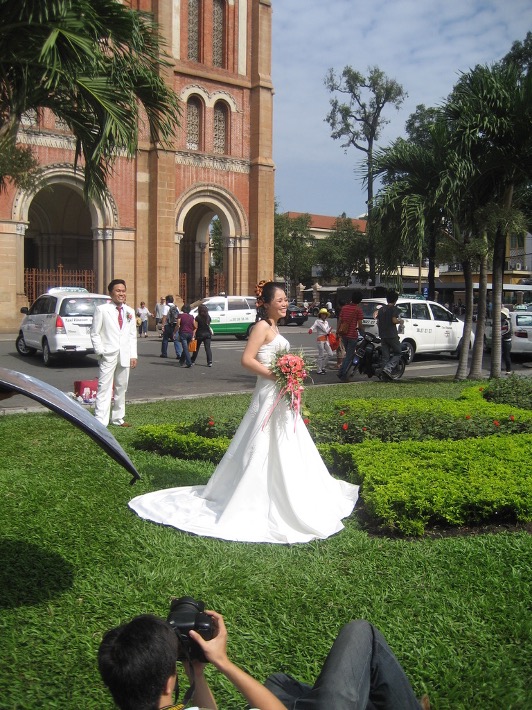
Across the square, Saigon brides in rented wedding dresses arrive to have their pictures taken against the cathedral backdrop. The groom sweats in the Saigon heat as the photographer poses his bride. The wedding is months away, but this day is almost as important. Photos are taken, curated, placed in a white leather album with gold lettering, and delivered to the bride. I try not to be cynical, but for many this day and the photographs may be the highlight of her life.
After the wedding, she will likely be scrubbing floors at home while he sits on a little plastic chair drinking beer with his buddies. The wedding album will remind her of happier times. She’ll cover it in plastic and place it in a prominent place near their at home shrine. It will remind her of the day by the cathedral when she was a princess.
____
At 10° north of the equator, there are only two seasons–hot and wet – hot and wetter. Days and nights are almost equal in length – regardless of season. Sometimes it’s the only consistency we can count on.
By 8:30 both temperature and humidity are beginning to climb. Cumulus clouds are building and will continue to billow upwards until midday—then unload. The city is built on a swamp next to a river, and the central business district is all below mean sea level. Saigon rainstorms are legendary. Within an hour the street will be ankle deep then just as quickly be dry. Every motorbike has a plastic rain poncho stashed in the seat compartment. They go on quickly and come off just as quickly.
There’s no rain yet, but it’s time to finish our lattes and get going.
_____
Marilynn heads back to the apartment at 95 Nguyen Van Thu where she works remotely with her US healthcare clients, and I head for the office.
As I walk, I see need everywhere. Men sleeping in doorways. Maimed beggars. People in rags. A woman seated on the curb selling single cans of Coke. Another with a small hibachi roasting small pieces of some kind of meat. A man in a Tommy Hilfiger T-shirt sits like a statue and watches me every day with an expressionless stare. This is not the downtown financial district of upscale boutiques and skyscrapers. This is District Three, close to downtown but an area where rents are cheaper.
Arriving at the office, I’m greeted warmly by Nga, our perfectly groomed receptionist. At 20 years-old, this is her first real job. She lives with her mother in a modest Vietnamese apartment, and though I don’t know the extent of her education she is up to date on current affairs and her English skills are passable. It’s a mystery how she manages on the $500 per month we pay her, but she has an Apple laptop, the latest iPhone, and a fashionable wardrobe.
Nga is aspirational, and studies Marilynn’s manner closely. She has Western tastes and an interest in floral design, but she’s caught in a double bind. Her culture doesn’t value women. Most of her boyfriends are not as well educated and likely headed for those little chairs and beer in the afternoon. My fingers are crossed that her fate will be better than the Saigon brides at the cathedral.
Like other offices, large and small, our people bring their motorbikes inside and park them in the reception area. It’s all about security. No chain or lock will prevent their theft if left outside. At first, it’s jarring and incongruous to see Nga at her desk, art on the walls, copies of Persian rugs on the tile floor, and a couple of motorbikes parked just inside the door. Soon, it seems normal.
I believe what we do is making a difference, but sometimes it feels like we’re shoveling against the tide. A pregnant woman, about to deliver, may have to ride 30 miles on the back of a motorbike to get to the hospital we built in her province, but it’s 20 miles closer than the nearest one last year.
I feel like I’ve gotten as much or more from the Vietnam experience than the people we serve. I came with assumptions, went through a honeymoon period where I only saw good in the people, then a dark period when everyone seemed corrupt. Lately I’ve come to the realization that, for most Vietnamese, life is about survival. There is overwhelming need and limited resources. There’s never enough.
Today I’m having lunch with Jack Howell, the CEO of Prudential Insurance. Jack and his wife, Jennifer have become friends. Right now, he and I are working together to get Prudential to underwrite the purchase of light therapy machines and other equipment for neonatal wards in hard to reach areas of north Vietnam and the Mekong Delta. We’re close to a deal but philanthropy is not a high priority at Prudential headquarters, and I need Jack to put push the corporate bureaucracy.
Jack and Jennifer are two of our friends who’ve decided to remain in Asia. It’s not for everyone, but expats are well compensated and international schools offer their children an excellent education. They rotate through a sequence of capitals, here for 3-5 years, then someplace else for another 3-5. Tokyo, Beijing, Hong Kong, Seoul, Manila, Bangkok, Saigon, Singapore, and Jakarta are all in the rotation.
There are also a handful of Westerners have found a home here, learned the devilishly hard language, married locally and made the transition, but most of us are outsiders with special skills who rely on staff for language, business practice, and cultural guidance to accomplish our missions.
I try not to think about what America did here in the ‘60s and ‘70s, but it’s always there. Americans have given generously to rebuild the country they nearly destroyed, but good intentions without an understanding of the culture are not enough. Almost every month I see a well-intentioned church group or small charity bring in sophisticated medical equipment that ends up rusting in a corner of the hospital, because it couldn’t withstand the humidity, the surges in electrical power, operating instructions only in English, or no parts or people to make repairs.
My lunch with Jack is, as always, a mixture of business and pleasure. We’re both endeavoring to do well by doing good. After lunch we shake hands and lament the absence of Jennifer and Marilynn. The bun cha (Vietnamese meatballs) was tasty, and they would have enjoyed it as well.
_____
At the close of the business day, Marilynn and I meet at The Refinery, an old opium factory turned watering hole that serves Western fare and Carlsberg draft. It’s 5:30 and already dark.
We find a table in the restaurant’s tented foyer and swap stories about our respective workdays. It’s wind down time, and the small, close knit, expat community is gathering in places like The Refinery. It’s collegial, refreshingly egalitarian, and communal. Expats in other parts of the world seldom enjoy the same small-town feel. Here, faces are familiar and there are nods of acknowledged commonality even if the names are unknown. In the expat tropics there is little social hierarchy.
On the ride home we sit back in the air-conditioned comfort of the cab. The skyline is awash in neon – Mercedes, Prudential, Dai-Ichi Life, Gucci, BP, Citibank, HSBC, Nike. Ho Chi Minh would be horrified, but international companies are homogenizing most of the world capitals. Saigon is no exception. Banana Republic and H&M bracket a local Pho restaurant.
Mr. Vinh slips the latch and greets us when we arrive at 95D. In at least one sense we’ve adapted. Our comfort zone has expanded so that we no longer notice the locked gate or see the barbed wire on top of the wall. As we enter, we catch the familiar whiff of cigarette smoke mingled with Indian spices spiraling down the stairway. We’re back in the cozy, warmth of 95D. This is home for now.
It’s 10 p.m. and the temperature is still over 80°. Tomorrow will be similar. Every day is an adventure, and an opportunity to make things better. The cause is worthy, but beyond that we’re beginning to understand why so many of our friends have chosen this life despite the noise, downpours, smells, sticky heat, and inconvenient power failures.
Will the country overcome its obstacles—the corruption, inefficient bureaucracy, hesitant foreign investors, poor infrastructure, and bankrupt banking system? The jury is still out, but I wouldn’t bet against the Vietnamese. Remember the “American War?”
_____
The walls are sweating. The AC cranks up. The ceiling fan circles above us. I turn out the light and pull the single sheet over us. A motorbike breaks the silence. NPR reports an early snowfall in Boston. Tomorrow is another day.
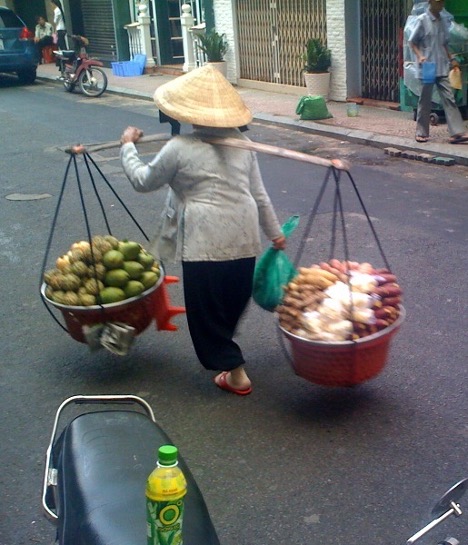































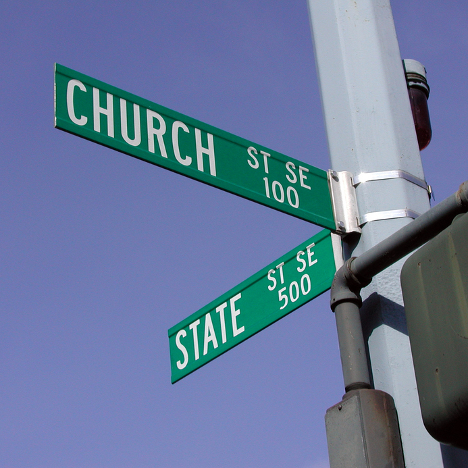
jack—what a great piece. glad I read it
I miss it all. those were amazing days
so many opportunities. you captured it. you remembered it all
thank you
hope you are both well
love Steve G
Soooo descriptive!! It brings back so many memories of our three trips to Vietnam, totaling about two months. I laughed remembering our Saigon Airbnb apartment where we had to leave our shoes in the lobby, but everyone parked their scooters in the lobby! We’re hoping to go back sometime, but at this stage who knows when.
Thanks, Linda. I won’t be going back but it was one of the highlights of my life. I hope you get there if it’s what you want. At this point I just want this Covid business to leave us alone.
Jack,
I really enjoyed this blog. Brought back all sorts of memories.
And I wonder, are you & Marilynn back in Vietnam? Or was this an older
blog recycled?
Would love to get together for lunch sometime – in Seattle. I think my traveling days
have ended due to some health issues.
See Russ at least monthly as part of book group.
Hugs to Marilynn and you.
Mark
Thanks, Mark. I had written several things about the experience but this was new. Tried to nail down a typical day.
Be well. Hi to Kimberly
Thanks Jack,
As always interesting.
Jack, what a perfect capture of Saigon’s essence. Love the people, love the food. Terrific writing…like a peek inside an artist’s sketchbook. Same colors of the street and people…the small plastic chairs, the tea/coffee drinkers and the ersatz Western brides at the cathedral.
Takes me back to ‘93 trip to Hanoi, Saigon and My Tho. I could hear the cycles and traffic noises in your prose. Mac
Mac: Thanks. I’m flattered – that’s what I was hoping to achieve with the piece. It’s always nice to know when people get it.